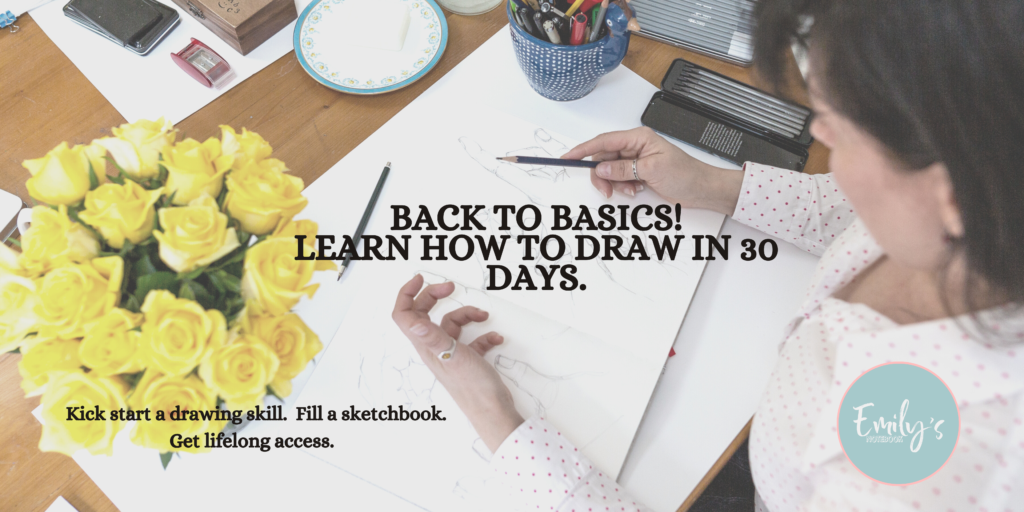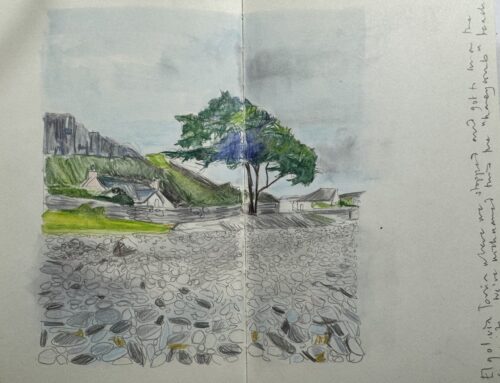Yes. I have a list of top 5 drawing myths! Probably only the tip of the iceberg in all honesty.
There are so many things I wish I’d known about when I picked up my sketchbook just over 3 years ago. I’ve selected 5 of the most common myths that rear their heads from the conversations I have with my community.
Predominantly, what hindsight is continually teaching me is that the drawing journey is less to do with technical and practical skill and more to do with my mindset and attitude to success. I am believing far more deeply that everyone, should they want to, can draw and create. They just need tenacity, focus and a willingness to research and understand how to succeed based on their personal backgrounds and viewpoints.
We never stop to consider this aspect of our creativity because arguably we have been subjected to social and cultural conditioning when it comes to developing our creativity. Have you ever stopped to genuinely question WHY you adamantly say “I can’t possibly draw?” What preconceived belief system is at play even before you pick up that pencil to draw?
In order to reach the holy grail of focus, “I can do this,” tenacity and a willingness to fulfil your creative lifelong ambition lets start to dispel some of those pesky myths.
Table of Contents
1. I Have No Formal Art Training or Education.
Neither do I. What meagre tasters I learned were delivered in school. Sadly, the experience, regardless of whether I loved being creative was doomed from the start based on a) lack lustre and sporadic teaching rammed into a crammed curriculm b) pigeonholing me into a good, bad or downright ugly category within a few weeks and c) the inevitable final ultimatum of having to “choose” which subjects would be useful for my future, the poor artist not being quite one of them.
I only returned to the first pages of my sketchbook in my early forties and, I hasten to add, not with the specific outcome of wanting to improve my drawing skill but rather my wellbeing. (Perhaps you too reading this have found me, not because you are keen on improving your skills but rather your emotional wellbeing and the need to just be creative.) The improving to draw naturally evolves the more you draw.
Just because you never formalised your love of art, or got the qualification to say you can do this, doesn’t mean you’re no good at it.
You can still go and acquire the knowledge and skillset you need to get started, build a drawing habit and achieve great success however you choose to use it.
The dedication and determination with which I see students wanting to learn as much as possible and end up successful artists with no said qualification, is testament that this particular belief is not relevant in today’s climate or more importantly in YOUR life. They may just get there a little later and via a different route.
I am also wildly encouraged that just because people have had an arts education they still, for similar reasons to my own, have found themselves abandoning the very thing they have loved, only to be returning to it years later and addressing different aspects of their skill set.
2. I Either Have A Drawing Talent or I Don’t.
Were you born with a pencil in your hand?
I’m not undermining talent. It has a role to play and, of course, there are naturally gifted people who have a natural propensity to drawing and creativity. Let’s not underestimate though that talented people still need to work at it. Research has shown that grit and determination to succeed plays more of an important role as to whether or not you become successful at it. I’ve spent a lot of time exploring these factors in my own quest to become a better artist. Our talent can sometimes be our downfall because we can come to depend too much upon it as opposed to working hard and tenaciously to master a technique.
We are quick to jump to conclusions about whether or not we have the talent. Before we do so, however, have you ever stopped to ask yourself whether you’ve been given the skills, knowledge or tools you need to draw? Do you actually know what they are?
How do you know what you don’t know?
How much time have you taken to stop to think about your creativity? We assume that our creativity belongs in the present moment, that we should be naturally good at it as if by osmosis. We rarely talk about the need to work on our creative skill set. Think for a moment about the attitude with which you approach your drawing. Is it something you do when you have time? A hobby? Or something much deeper? Did you purchase a sketchbook on a whim hoping to fill it and then get stressed or identify that you the procrastinate for example in your bid to be more creative?
All of the negative connotations that we derive from a creative habit flow from the mindset with which we approach it! Check out one such example in my article on procrastination!
How do you know you’re not talented once you unlock the understanding? This is one of the most satisfying things to watch unfold as the penny drops for people and they see their creative potential unfurl. It becomes irrelevant as to whether or not they feel they have the talent.
Have you thought that your creativity might need a strategy and framework around it to support you succeed at it?
3. I Was Told I Was No Good At School!
This is one of my most top ranking myths!
If you’ve not yet watched Ken Robinson’s Ted Talk on Schools Killing Creativity, you’d be reassured that you are not alone in labouring beneath the words and attitudes spoken over you when younger or at school!
How frustrating and sad, that this can rankle long and deep and hard into our later years in life and stop us dead in our creative tracks remembering earlier experiences in the classroom or a grading system. But more importantly accepting it as gospel and perhaps realising too late, when we have the confidence to know better, that our creativity deserves a chance.
One learner was castigated for spending too long looking at an object and not at her paper and was told she was no good! She couldn’t believe it when, in the first module of my Back to Basics Course, she had to, ironically, return to observing the object and learning to “see” what she would be drawing more than her paper. The exact opposite to what she had been berated for in earlier life. She returned back to drawing in her late 60s, knowing herself well enough “to want to give it another go!”
Another learner was always told she was no good at drawing and should stick to painting instead. She was so frozen when it came to drawing anything and immediately convinced herself that her drawing was never any good. The mindset with which she approached drawing was always with dread as a result. That dread needed to be turned to excitement and joy at the prospect of drawing!
I encounter deep sadness from people who have had negative words spoken over them in earlier life and have realised much later on that their urge to be creative and draw, far outweighs the years wasted believing the negativity about themselves.
Who’d have ever thought that mindset is a key component to your drawing success.
Closely linked to this realisation comes the question often asked, “Am I too old to learn to draw?” (A subject I will come onto exploring in a further blog post.)
4. Drawing Should be Easy! Therefore I Can’t Draw At All!
Should drawing come easily? I don’t think so.
Drawing is based on skill. Knowing which skills you need to become successful at, will support you achieve it. Do you for, example, know what the fundamental drawing principles are? Check them out here if you don’t!
There is no doubt whatsoever that a totally unique set of observational, and analytical skills also start to come into play when you learn to draw. Some people are able to grasp these naturally but, what we rarely seem to understand, is that some of this ability has been lost over time based on some of the other reasons mentioned in this article.
Our cultural conditioning, and the way we use our brains can cloud our approach to getting creative when we draw. Betty Edwards in her cult classic Drawing on the Right Hand Side of the Brain, spends a lot of time discussing the different roles the right and left sides of our brain play in our creative approach.
Drawing can become easier to master, for sure.
5. I Make Too Many Mistakes
Good. Keep going. Your mistakes will teach you faster than anything else. The key point to understand and ask yourself here is, do you know why and where you are going wrong? Equip yourselves with understanding some of the basic principles of drawing and you will see yourself making vast improvements on the back of lots of mistakes. Turn the page, move to the next piece of paper and keep going. Emulate all the great masters who did the same thing!
…And when you approach that piece of paper or sketchbook, leave all notions of perfectionism behind. Embrace the imperfections and don’t worry about the mistakes you make.
Why do we assume being creative is something we should be naturally good or bad at? Where has that pre-conceived notion come from? To play devil’s advocate too, are you being too hard on yourselves when you approach drawing? Changing your mindset to appreciate the process, understand what it is that you need, and not the end product or the outcome of a great piece of drawing, releases the pressure of great expectations which is where we invariably end up falling down.
In conclusion.
Where do some of our preconceived ideas come from when it comes to learning to draw or be creative? Just pause and ask yourself what your own personal belief systems are about how capable you are when it comes to learning to draw. Drawing is not an easy skill to master, one is not just born able to execute it, your mindset is a critical factor and no one has the right to define your creativity on your behalf, school or otherwise.
What you can focus on doing if you know that this is an area you want to pursue is to equip yourself with the right mindset and methodology to get you there.
Emily’s Notebook is committed to supporting people uncover their personal success frameworks when it comes to drawing. The Back to Basics. Learn to Drawing 30 Days Course does exactly that!








